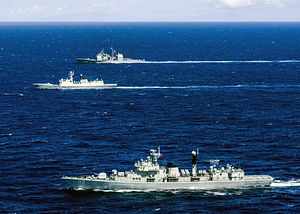U.S. President Barack Obama just finished a state visit to Japan last week. In a delayed joint statement released on Friday, the United States, for the first time, clearly said that America’s “commitments under the U.S.-Japan Treaty of Mutual Cooperation and Security … extend to all the territories under the administration of Japan, including the Senkaku Islands. In that context, the United States opposes any unilateral action that seeks to undermine Japan’s administration of the Senkaku Islands.” This, perhaps, is the only achievement for Japan as a trade agreement was not reached by the two sides.
Since the U.S. has given Japan a clear assurance in writing to help Japan defend the Diaoyu/Senkaku islands, shouldn’t Japan feel reassured? But from a Japanese perspective, Obama’s state visit just makes the U.S. commitment to Japan’s security less credible. Some scholars contend that such worries are unfounded and irrational. That view is flawed. Actually there are four good reasons why Japan still feels insecure.
First, there is an inherent problem in any alliance relationship that makes credibility always imperfect. It is the moral hazard problem. Basically, it means that a client state will tend to act recklessly because it believes that the patron state will offer unconditional support, thus dragging the patron state into an unnecessary conflict or war. Because of this entrapment problem, the patron state will always be very careful not to give a “blank check” to the client state when it comes to security assurances. The result is that the client state, in turn, will always be suspicious of the patron state’s commitment to its security. To maintain this alliance relationship, the patron state will need to constantly reaffirm its commitment to the client state through actions or words. This is partly why the U.S. has always emphasized that it is neutral on the sovereignty issue of the Diaoyu/Senkaku islands, thus disappointing Japan.
Second, there is the problem of divergent interests between Japan and the United States. While Japan might highly value the Diaoyu/Senkaku islands for historical, economic, and strategic reasons, most Americans simply view the islands as a bunch of rocks with very little value to the U.S. interest in the region. There is no U.S. military base or U.S. military presence on the islands, and thus a possible attack by China on the islands will not result in American casualties. Moreover, the U.S. highly values a stable and peaceful relationship with China as the two share a number of common interests. Under such conditions, it is hard for the U.S. to decide to aid Japan militarily even though the U.S.-Japan Treaty of Mutual Cooperation and Security theoretically covers the islands, as President Obama just confirmed during his visit in Tokyo. Moreover, both Japan and the US understand this point perfectly. When two parties of an alliance relationship have seriously divergent national interests, it is unsurprising that the client state would doubt the patron state’s commitment to its security.
Third, there is the problem of power shifts in Asia. Although no one doubts that the U.S. is still the only superpower in the world and will remain so for another 20 or so years, many countries in Asia are still concerned about the future distribution of power between China and the United States. China’s military spending is increasing quickly whereas U.S. military spending is contracting. The controversial “pivot to Asia” will be seriously hindered if the U.S. is unable to finance it, evidenced by recent remarks by U.S. defense officials.
Finally, the past inaction toward regional crises in Syria, Crimea, and the East China Sea have seriously undermined U.S. credibility in the world, thus making Japanese officials more nervous about the U.S. commitment to Japan’s security. While many U.S. scholars (here and here) are quick to point out the main differences between Syria and Crimea and Japan as Japan is an ally of the U.S., what they have forgotten is that Japanese perceptions of U.S. credibility ultimately matter. In this case, Japanese are rightly worried that Obama is a weak president and cannot act tough when a crisis comes. Furthermore, it is not just one event that undermines the U.S. credibility; it is a series of events from Syria to the East China Sea (the U.S. only verbally protested when China declared its East China Sea Air Defense Identification Zone in 2013) to Crimea that together seriously undermine the U.S. credibility.
In short, we cannot really blame the Japanese for being irrational or paranoid when they question the US credibility. Three of the four reasons for Japanese doubts are structural reasons and they do not change quickly. That means U.S. credibility will continue to be questioned by U.S. allies around the world. Perhaps the United States can demonstrate its credibility by acting tough the next time a regional crisis emerges. Until then, it is not surprising that Obama’s weak assurance this past week to Tokyo only exacerbated Japan’s doubts and fears.

































